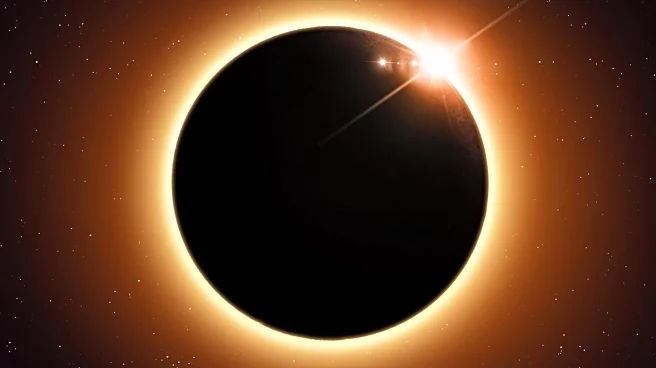What is the story about?
What's Happening?
Europe is gearing up for its first total solar eclipse in 27 years, set to occur on August 12, 2026. The eclipse will be visible across the continent's extreme northwest and southwest, with prime viewing locations in Iceland, Spain, and Greenland. The moon's shadow will span 182 miles wide and take approximately 96 minutes to traverse the Earth. The eclipse will reach its peak with the sun positioned about 26 degrees above the horizon, offering a maximum of 2 minutes and 18 seconds of totality. This celestial event coincides with the peak of the Perseid meteor shower, adding to the spectacle. Notable viewing spots include Iceland's Blue Lagoon, Ribera del Duero in Spain, and Scoresby Sund in Greenland, each offering unique experiences and durations of totality.
Why It's Important?
The 2026 solar eclipse presents a rare opportunity for astronomers, photographers, and tourists to witness a significant celestial event. It is expected to draw large crowds to the best viewing locations, boosting local tourism and economy. The event also offers educational opportunities, with festivals and gatherings planned to include scientific discussions and cultural activities. The eclipse's occurrence alongside the Perseid meteor shower enhances its appeal, potentially increasing interest in astronomy and natural sciences. This event underscores the importance of preserving dark sky areas and promoting sustainable tourism practices.
What's Next?
As the eclipse date approaches, preparations are underway in the prime viewing locations to accommodate the influx of visitors. Local governments and tourism boards are expected to organize events and provide resources for safe and enjoyable viewing experiences. Cruise-based tours in Greenland and festivals in Iceland are being planned to maximize the event's impact. Stakeholders in the tourism and hospitality industries are likely to collaborate to ensure infrastructure and services meet the anticipated demand. Additionally, educational institutions may leverage the event to promote science and astronomy programs.
Beyond the Headlines
The solar eclipse highlights the cultural and scientific significance of celestial events, fostering international collaboration and interest in space exploration. It may inspire future generations to pursue careers in astronomy and related fields. The event also raises awareness about the importance of environmental conservation, as many viewing locations are in ecologically sensitive areas. Promoting responsible tourism practices will be crucial to preserving these natural landscapes for future celestial events.
















